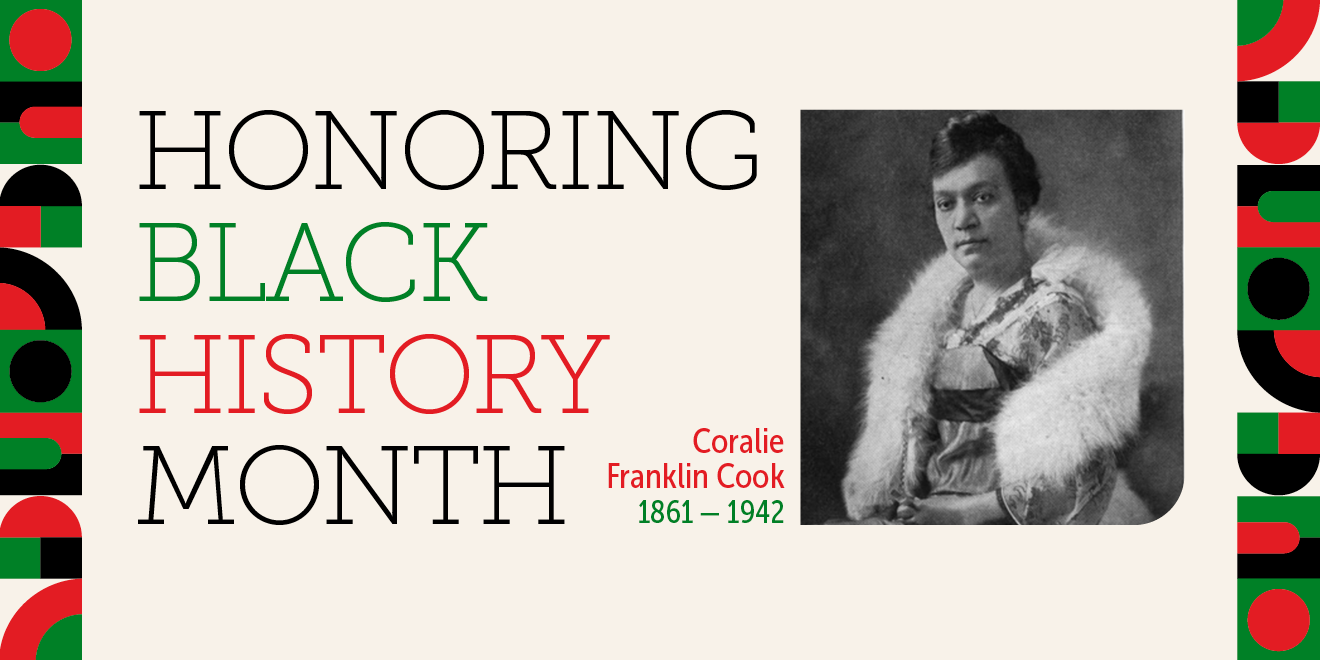
As we honor the voices and stories of Black History Month, we’re pleased to share the history of Coralie Franklin Cook, a Black activist, suffragist, orator and scholar. We thank Dr. Kimberlynn Heller, Obstetrics & Gynecology East, for bringing Ms. Franklin Cook’s story to us. These two women share a connection in Howard University, where Dr. Heller earned her B.S. and Ms. Franklin Cook taught elocution.
Coralie Franklin Cook
Descended from slaves owned by President Thomas Jefferson, Coralie Franklin was born in Lexington, Virginia in March 1861, the younger of two daughters from Albert Barbour Franklin and Mary Elizabeth Edmondson. Her parents were enslaved by Southern First Families of Virginia (FFV). She was a descendant of Elizabeth “Betty” Hemings, an enslaved mixed-race woman, whose children and many descendants occupied the most valued household and tradesman positions at the President’s home, the Monticello. Franklin’s maternal great grandfather, Brown Colbert, was a former slave at the Monticello estate. Colbert was the son of Betty Brown and the grandson of Elizabeth (Betty) Hemmings. Franklin had one older sister named Mary Elizabeth.
In 1870, their father, Albert Franklin placed his two daughters in the Storer Normal School at Harpers Ferry. She graduated from Storer Normal School in 1880. While attending college, Franklin was an honorary member of the Delta Sigma Theta sorority, a member of the Red Cross, the NAACP, the Book Lovers Club and the Juvenile Protective Society. In 1881, Franklin continued her education through institutions in Boston and Philadelphia where she studied elocution. After a few years of teaching at her alma mater, she also taught a year of school in Hannibal, Missouri. She and colleague Mary Church Terrell moved to Washington, D.C. to seek careers in education.
Franklin taught elocution at Howard University and was a professor at the Washington Conservatory of Music. She served on the Board of Education in Washington D. C., the second Black woman after Terrell to hold that appointment. Additionally, she spent five years as Director of the Home for Colored Children and Aged Women in Washington, D. C. Franklin and Terrell became prominent leaders among elite Black women and the Black Women’s Club movement. They were early members of one of the oldest Black women’s clubs, the Colored Women’s League of Washington, which eventually merged with other groups to form the National Association of Colored Women’s Clubs (NACWC) in 1896.
She also served as the head of the Home for Colored Orphans and Aged Women for five years. On August 31, 1898, Franklin married George William Cook, a professor and dean of the school at Howard University and NAACP member, and joined the faculty at Howard University. The Cook’s had one son named George William Cook Jr. on Dec. 15, 1901. She became the second Black woman appointed to the D.C. school board. Franklin Cook was active in the woman’s suffrage movement. She and Terrell were active members of the National American Woman Suffrage Association (NAWSA) and part of the association’s inner circles.
She was also a member of the Coleridge Taylor Choral Society and was elected president of the Washington Artists’ Association. She spent five years as head of the Home for Colored Orphans and Aged Women in Washington D. C. Franklin Cook was a powerful public speaker. She was the only Black woman invited to give an official statement at Susan B. Anthony’s 80th birthday celebration in 1900. Her address praised the movement for encouraging women to recognize their potential political power and their responsibility to one another and emphasized the necessity of interracial empathy. She stated, “no woman and no class of women can be degraded, and all womankind suffers thereby.”
She was disheartened, however, because she felt as if the cause of Black women was not a priority among white women active in the suffrage movement. She insisted that the elite white women do not ignore the political rights of those that were less fortunate. In fact, she addressed Anthony directly, stating, “…and so, Miss Anthony, on behalf of the hundreds of colored women who wait and hope with you for the day when the ballot shall be in the hands of every intelligent woman; and also, on behalf of the thousands who sit in darkness and whose condition we shall expect those ballots to better, whether they be in the hands of white women or Black, I offer you my warmest gratitude and congratulations.”
In a speech entitled “Votes for Mothers,” Franklin Cook again stressed the importance of enfranchisement for both women and people of color. She stated, “Disfranchisement because of sex is curiously like disfranchisement because of color. It cripples the individual, it handicaps progress, it sets a limitation upon mental and spiritual development.” Franklin Cook spoke at the Colored Women’s League convention in Atlanta, Georgia in 1895 and gave a presentation on “Negro Poets” at the First Race Amity Convention in 1921.
In 1884, Franklin Cook purchased a home in Harpers Ferry at 509 Fillmore Street. Franklin purchased the home from Storer College where she was teaching at that time. Franklin Cook and her husband were married for thirty-three years until George died on August 20, 1931. Franklin Cook’s sister Mary Franklin was married to attorney J. R. Clifford, a civil rights leader associated with the Niagara Movement. Coralie Franklin Cook died in 1942, at eighty-one years of age.